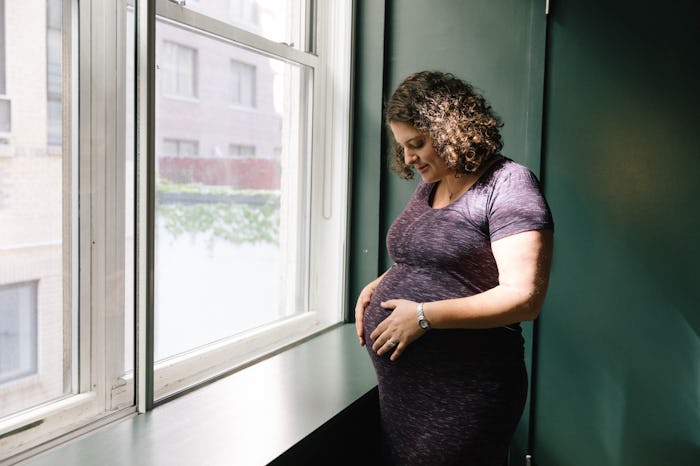Life
These 9 Signs Of Labor Can Mean Your Baby Is *Finally* On Their Way
Pregnancy — especially the first time around — comes with a lot of "is it time?" questions as you near the end of your 40 weeks. Every movement in your belly is a possible contraction and each trip to the bathroom brings with it an examination of what you're leaving behind in the toilet. Anticipation and eagerness have you on the look out for potential signs that it's baby time, but even if you do spot a few, you still might wonder, "Am I in labor?" Experts say there are a few key things you'll want to keep in mind.
"When to make the drive to the hospital varies for every pregnant woman," Dr. Sherry Ross, OB-GYN at Providence Saint John’s Health Center in Santa Monica, California and author of She-ology: The Definitive Guide to Women's Intimate Health. Period., tells Romper in an email interview. One major factor? Pain, Ross says. "If you can tolerate the pain and are able to easily breathe through the contractions, you may be able to stay home a bit longer," she says. "Once the pain becomes more intense and increasingly painful, then it’s time to gather your hospital bag and head over to the hospital."
One thing my mom assured me as I neared the end of my pregnancy and constantly questioned whether I was feeling contractions? "Trust me, you'll know."
And, man, was she right.
1Contractions Kick In
"We usually give this rule: contractions that last a minute from start to finish, five minutes apart, and last for one hour," Dr. Yvonne Bohn, OB-GYN at Providence Saint John's Health Center in Santa Monica, California, tells Romper in an email interview. "We call it 5-1-1. If you break your bag of water, labor will usually start within 24 hours."
2Your Water Breaks
"Another sign that early labor has started is if your bag of water breaks," Ross tells Romper in an email interview. "It may be a subtle 'leak' or a 'big gush' when your 'water breaks' and you may or may not have uterine contractions. But one thing is definite, early labor will begin within hours of your water breaking."
3You Have All The Bodily Fluids
Felicia Roche, a birth doula and founder of Bay Area Birth Education, said a sure sign of active labor includes at least three of four potential bodily fluids: amniotic fluid, blood (bloody show), vomit, and tears. "Whenever a client asks what those are, my answer is, 'You’re not going to like them,'" she told Bloomlife.
4You're A Little Nauseous
"The earliest signs of labor can often be missed because they may mimic the end of pregnancy," Robin Elise Weiss, a doula and the author of The Complete Illustrated Pregnancy Companion, tells Romper in an email interview. "For example, some women feel slightly ill, perhaps like they are getting the flu."
5You Notice More Bodily Fluids
"Preemptive labor signs are ones that indicate that the body is changing and nearing labor, and they range widely," Abby Reichardt, a senior student midwife at the Florida School of Traditional Midwifery, tells Romper. "Some women may experience several of them, some may experience one or none at all." Reichardt says, for example, some women experience loose stools leading up to labor, which is often accompanied by cramping and/or low back pressure.
6You Drop
"Signs of labor indicate that the onset of labor is probably within the week," Dr. Donnica L. Moore, president of Sapphire Women's Health Group and host of the In the Ladies' Room With Dr. Donnica podcast, tells Romper. "This includes 'lightening,' when the baby drops down further into the pelvis, often decreasing the apparent size of a woman's abdomen. Pressure on the diaphragm decreases, making it easier to breathe, but bladder pressure increases."
7You Have A Burst Of Energy
Reichardt says some women also notice a burst of "nesting energy" where they "confidently take on any and all preparatory tasks still waiting to be done." According to the American Pregnancy Association, nesting is a common instinct "to prepare for birth" that many pregnant women experience.
8Your Cervix Says So
One major sign that you are ready to go? Your doctor notices that your cervix is effaced. "Effacement is the thinning process of the cervix in preparation for labor," Caleb Backe, a health and wellness expert for Maple Holistics, tells Romper in an email interview. "Also called cervical thinning, effacement is usually checked by the healthcare provider in the weeks prior to the expected due date. This process is generally painless and is often considered the first stage of labor as the baby gets in position to be delivered."
9You Just Are
According to Yiska Obadia-Gedal, a doula and comforting touch for birth educator, the number one sign is that you'll just know you're in labor. "Doctors and midwives will often advise expectant parents not to go looking for labor — labor will find you," she tells Romper in an email interview. "A person is only in true labor when they are contracting regularly." Obadia-Gedal adds that if you are unsure about whether or not you are experiencing contractions, then you're not in labor.
Check out Romper's new video series, Romper's Doula Diaries:
Watch full episodes of Romper's Doula Diaries on Facebook Watch.
